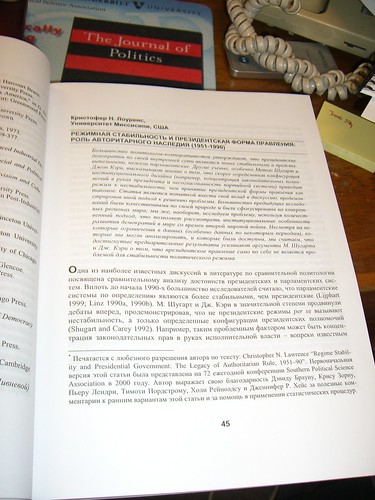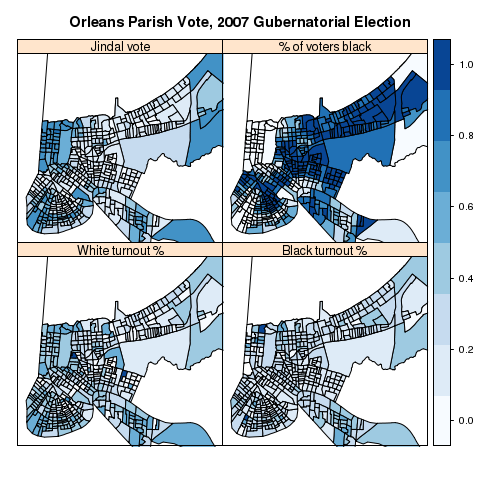There are, to steal John Edwards’ shopworn phrase, indeed “two Americas,” and the controversy surrounding Rev. Jeremiah Wright and presidential contender Barack Obama has brought that to the surface, most prominently in the latter’s speech Tuesday in which he discussed the distinction between the African-American experience and the experiences of whites in this country. I haven’t had time to read all the commentary the speech has generated, and probably won’t, but I will at least commend my OTB co-blogger James Joyner’s take as well as that of Marvin King.
The existence of this disconnect is, of course, nothing new in American politics—indeed, perhaps the oddest feature of modern American political history is that for a few years enough of the gap between the two Americas was bridged to bring the Civil Rights Movement to fruition and partial accomplishment of its goals. But as we all know, even that bridge was a fleeting one; in a small bit of serendipity, the Memphis Commercial Appeal revisited a point by which that bridge was largely washed away, the 1968 sanitation worker’s strike.
The paper’s (somewhat unsatisfactory, largely for its failure to recognize that even if white leaders in Memphis—including the CA editorial board—had seen it as a form of civil rights protest, rather than a labor action, they still would have seen it as a threat to public order) effort to address its own coverage of that strike here and here addresses the fundamental disconnect: most blacks saw the Civil Rights Movement as a means to an end, getting redress for the economic and social injustice of slavery and subordination, while whites primarily saw it (in the south) in terms of a challenge to the established political order or (outside the south) primarily focused on securing equal rights in a more classically liberal sense, such as equal standing before the law and the right to participate in the electoral process. As such, the post-Voting Rights Act movement found itself caught between a black community that didn’t think the movement had achieved enough and a white community that thought the movement had either achieved plenty—or, once the issues moved beyond abstract principles to more concrete implementation, such as integration of schools in redlining-induced de facto segregated communities across the nation, too much.
The unenviable challenge, I think, that Obama (and to a large extent, the Democratic Party he represents) faces is the need to move the debate beyond race—in other words, to diminish the importance of white-black differences—while simultaneously addressing the deep-seated, and in my mind broadly justified, demands of the black community for economic empowerment. Without diminishing the perceived racial differences—and, by extension, convincing working-class whites in the traditional Democratic coalition that economic empowerment is not a wealth transfer from them to blacks, a case that may be harder to make given that virtually any such empowerment (if in the form of government intervention) would necessitate increased federal taxation—the left has no hope of building a viable coalition that can do more than fiddle at the margins.
Update: As Megan McArdle indicates, that challenge won’t be a pretty one either, at least for those of us who don’t think the Smoot-Hawley Act was one of the high points of the Hoover administration’s response to the Great Depression:
And then he has to go and make possibly the stupidest remark in this entire campaign—or at least, Best in Class (you can't really expect him to outdo a television anchor.) "This time we need to talk about the fact that the real problem is not that someone who doesn't look like you will take your job, it's that the corporation you work for will ship it overseas for nothing more than a profit."
This is jaw-droppingly, head-shakingly, soul-cringingly, "Oh my God, maw, I think my eardrum just exploded" stupid.
"Don't be afraid of the people who don't look like you—be afraid of the people who don't look like you, and have the nerve to live somewhere else." They'll sneak over the border at night, steal your job, and sell it to some wetback hooker in Juarez.
I understand the political logic that forces Barack Obama to spend a fair amount of time hating on trade. But I sort of feel--call me a starry-eyed idealist though you will--that a speech urging Americans not to hate and fear people who are different from them, should perhaps itself forgo urging Americans to hate and fear people who are different from them. You know, to set a good example for the children.
Megan might be reading in a bit more xenophobia than Obama intended, but it’s a very short bus ride these days from being a Democratic presidential contender to a Dobbsian/Paulian/Tancredian foaming-at-the-mouth zero-summer-slash-Minuteman-wannabe.
![Welcome to Signifying Nothing [Signifying Nothing]](/local/memlogo-1.png)


